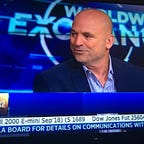Lessons Learned From The First 5 Weeks Of The Collective’s AI Web3 Accelerator
When we announced the launch of the Accelerator 10 weeks ago, we noted the Cambrian explosion of companies at the intersection of AI & Web3:
In April, we we’re excited to announce the 10 projects chosen to participate in Cohort #1:
AiGent Z — brings interoperable agents/content to gaming while protecting user information and privacy across chains and LLMs. Founders locations: USA / UK
Blocksee — A Web3 customer engagement platform that provides blockchain data to AI models. Founders locations: USA / Spain
FAI3 — Is a network for fair, transparent, and decentralized AI. Founders location: Argentina
Fathom — a comprehensive DeFi platform providing liquidity solutions to both retail and institutional participants. Founders locations: USA / Dubai
GRADIENTFI — Programmable embedded finance OS for vertical SaaS marketplaces to launch financial and DeFi products to their end-users. Founders location: USA / UK
Korra — a mobile first, AI-assisted, all-in-one DeFi aggregation and portfolio management platform. Founders locations: South Africa / Israel
Moi — Web3 Protocol for the real world. A simple, secure, and intelligent tech that aligns the emerging digital and AI goals with practical human needs via a participant-centric compute model. Founder location: USA
PayPangea– An AI powered crypto payments solution providing the ease of traditional online payments. Founder locations: UK / Gibraltar
PrismBlocks — An AI-powered blockchain cybersecurity engine Founders locations: Australia / USA / Israel / Netherlands
Sunfire Labs — Smart contract codebot that grows with every block. Founder location: US
Last week marked the halfway point of the 30 class program. Each class includes at least one guest lecturer teaching about their area of focus. Below is a list of the classes held to date and associated guest lecturers:
The classes have been recorded and are available for replay on our YouTube channel.
The success of the Accelerator will be judged, in large part, by how many cohort members get funded. So it’s not surprising that the highest rated classes have been on “The Elevator Pitch” & “Perfecting The Pitch Deck” by Andrew Ackerman, who ran the Dream It Accelerator in NYC for 7 years.
While all of the classes have been top notch, my favorite to date is Class #12 featuring Avery Ching, Co-Founder of Aptos, sharing the story of the hottest (IMHO) L1 of 2024.
As we plan out the 2nd half of the Accelerator, it’s helpful to reflect on lessons learned. Below are a few:
Founders Struggle To Effectively Tell Their Story
The most common mistake founders make when telling their story is trying to communicate too much information. Decks were all too long. And almost every slide in every presentation had too much information on it.
We suggest each Founder have a highly polished 30 second elevator pitch and a five minute presentation. The polishing is achieved via weekly Pitch Practice sessions with leading VCs. These are real pitches with real feedback in realtime. The best founders are taking in all the feedback and getting better rapdily.
Founders Have To Assimilate Disparate Feedback
The Founders gave three pitches in the first pitch practice session and two pitches in the second. Many founders commented on the conflicitng views they received from the different VCs. For example, one Founder mentioned how one VC told him to expand on the patents he mentioned, while another VC said not to mention patents at all, as they are prohibitively costly for most small companies to defend. Ultimately, each Founder needs to pick and choose which advice speaks to them.
Fully Remote Accelerator Programs Need To Provide Cohort Networking Opportunities
A major benefit of most Accelerator programs are the relationships formed between cohort memebrs. That benefit is greatly diminished when the program is fully remote. We’re just now starting to offer networking opportunities between the cohort members.
It Takes A Village And It Takes Time
We started with each cohort member meeting each week with their assigned Collective Mentor for 30 minutes. But more often than not, those sessions ran over. So we upped those mentoring sessions to an hour.
Each cohort member also meets each week with one of the two Accelerator Co-Leads (myself and Eric Bravick).
Finally, all of our guest lecturers have provided contact info and made themselves available to cohort members for for follow up conversations.
Like anything else in life, cohort members that prepare, and come to the mentoring sessions with specific questions, get the most from mentoring.
The More Bespoke The Better
At the end of the day, every start up is a one off, with a unique set of challenges and opportunities. While classes can be very helpful to provide broad context on various aspects of building companies, most of the major leaps in progress are made in one-on-one mentoring sessions where the specific needs of a company gets laser focus.
I’m confident, given the lessons learned, that the second half of the Accelerator will provide even greater value to cohort members than the first half. And I’m pretty sure we’re going to crush Cohort #2!
Click here to register for our Demo Day on June 12th from 12pm-2pm est.
If you got at least 0.00000001 bitcoin worth of value from this post please “Clap” below (up to 50 times), so others will see the post. Thanks!!
This content is for educational purposes only. It does not constitute trading advice. The author of this article may hold assets mentioned in the piece.
